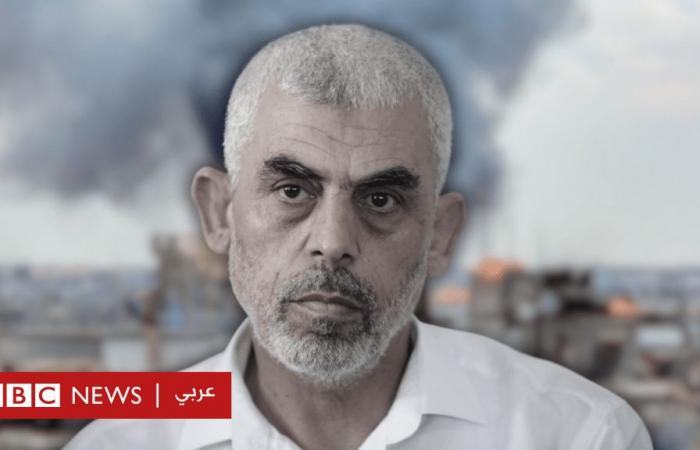image source, FLASH90/CANVA
1 hour ago
The killing of Yahya Al-Sinwar, head of the political bureau of the Hamas movement, dominated the opinion pages of a number of newspapers published today, and below we try to review some of them.
We start with the Jerusalem Post, which published an editorial entitled, “With Sinwar’s departure, Israel’s next step must be decisive.”
The Israeli newspaper said that killing Sinwar is a major achievement for Israel, and that it is one of the most important goals of the war that Israel has been waging in the Gaza Strip since October 7, 2023.
She noted that Sinwar was the only one surviving among the leaders who engineered the October 7 attacks, after Israel killed Marwan Issa, Muhammad al-Deif, and Ismail Haniyeh.
The newspaper saw that Israel was actually able to accomplish what many thought was impossible. It eliminated those responsible for the October 7 attacks.
The Jerusalem Post said that there is now a need to know what is the next step, especially since the war is not over yet?
“Israel’s arch enemy for the past year is dead.”
The newspaper indicated that Hamas still has armed elements and missiles at its disposal, and that there are still 101 Israeli hostages in its control.
She pointed out that the Lebanese Hezbollah group is “well-armed, and still represents a threat to Israel.” It also pointed to the Ansar Allah Houthi group in Yemen, which also represents a “threat to Israel,” in addition to the threat posed by Iran, which supports the aforementioned parties.
The Jerusalem Post asked about the next step, saying, “Can Israel begin to recover the hostages kidnapped from Gaza and is it pressing to conclude another deal to exchange hostages on favorable terms? Then will the Israeli army direct its focus to Iran or the Houthis?”
The Israeli newspaper believed that these questions need urgent answers, saying that we will wait to see which path our allies – especially the United States – want us to take.
“But now, let us take solace in the fact that Israel’s arch enemy over the past year is dead, and that some justice has been achieved for all those who have lost loved ones or suffered horrors since the October 7 attacks,” according to the Jerusalem Post.
image source, ACT
“A turning point in the course of this war”
We turn to the Washington Post, which published an editorial entitled “How can the killing of the Hamas leader help bring an end to the war?”
The American newspaper believed that Sinwar died the way he lived: “He died a violent death.”
It is likely that Sinwar died by chance, among a number of his comrades-in-arms above ground in Gaza, and was not hiding underground and surrounded by hostages as many reports described.
The Washington Post believed that the killing of Sinwar in this dramatic manner makes it clear that the war scenario – which was sparked by the October 7 attacks – may not have gone the way Hamas leaders, their allies, or those who support them had envisioned.
The American newspaper accused Al-Sinwar of having both Palestinian and Israeli blood on his hands, pointing to the hundreds of Israeli victims in the October 7th attacks on the one hand, and then the tens of thousands of Palestinian victims in the Israeli operation that came in response to the October 7th attacks, on the other hand.
The Washington Post believed that with the killing of Sinwar, along with other Hamas leaders, one of Israel’s declared goals for the Gaza war was achieved, which “could represent a turning point” in the course of that war.
“But what is less clear so far is whether the killing of Sinwar will hasten an end to this conflict.”
The newspaper responded, saying: “Certainly, Sinwar’s killing could help if the remaining Hamas leaders accept Israeli Prime Minister Benjamin Netanyahu’s offer: surrender and hand over the remaining 97 hostages in Gaza.”
“But this is very unlikely,” the Washington Post said.
The American newspaper added, “However, the killing of Sinwar could provide an opportunity to renew talks regarding a ceasefire and prisoner exchange deal,” especially since Sinwar’s intransigence has long been a “difficult obstacle” to reaching any agreement, according to US National Security Advisor Jake Sullivan.
“This is an opportunity that Netanyahu must take advantage of, resist his arrogant tendencies, and not listen to the advice of members of his government from the extreme right,” according to what the Washington Post added.
The newspaper believed that US President Joe Biden must continue to push Israel towards concluding such a deal with Hamas, as well as towards containing the missile war with Iran.
image source, : AFP
“Has the time come for realism, rationality, and thinking about tomorrow?”
We conclude our tour from the London-based Asharq Al-Awsat newspaper, with an article entitled “What happens after the killing of Sinwar?!” By Saudi writer Mishari Al-Dhaidi.
Al-Dhaidi began by saying: “Now that the Israeli military machine has reached Yahya Al-Sinwar, the first target, since the beginning of this terrible war, in Gaza, the curtain has come down on a decisive chapter from the book of Hamas, no, from the book of Gaza, no, from the book of Palestine, no. Rather, from a book or books on War and Peace in the Wounded Middle East.”
Al-Dhaidi added: “Al-Sinwar is an authentic, organic piece of the Hamas body, and the climate of its birth. The man who was born in 1962 and joined the Brotherhood in his youth, had a “jihadist” vision and plan, meaning that he was a supporter of the military solution, and his relationship with Hamas’s political office, i.e. Khaled Meshal. The rest of the “doves,” as they are said about them, are the coordination between these people and his group, i.e. the Voucher Brigades… He reached the pinnacle of his power within Hamas, or was on his way to it, after he founded, with others, and headed the “Majd” security apparatus, to protect Hamas and its authority. “.
The writer continued: “It was said that Sinwar is the one who is managing the negotiations on this devastating war on the people of Gaza, and even all of Palestine… and that he is – exclusively – the one who has the decision to make war and peace. And that Meshaal and the rest of his brothers are for a political solution, but Sinwar refuses. Israeli Prime Minister Netanyahu was unable to impose retribution on Sinwar for the October 7 raid. Does the killing of Sinwar mean the end of the excuse of both parties: Meshaal and his companions, Netanyahu, and his war group?!
Al-Dhaidi concluded by saying: “Israel can be proud today of the killing of its first enemy in Gaza, after a frightening harvest of casualties and destruction in Gaza. It is indeed a great achievement, without arrogance, but what next?!”
At the end of his article, the Saudi writer asked: “How will Israel spend this military gain in politics?! Is there an end line for this war, even if a hundred Sinwar and Nasrallah are killed? In the end, there must be a political horizon, a drain and an outlet for all these fumes and hot currents, or It will explode again, so has the time come for realism, rationality, and thinking about tomorrow…for everyone?!”






